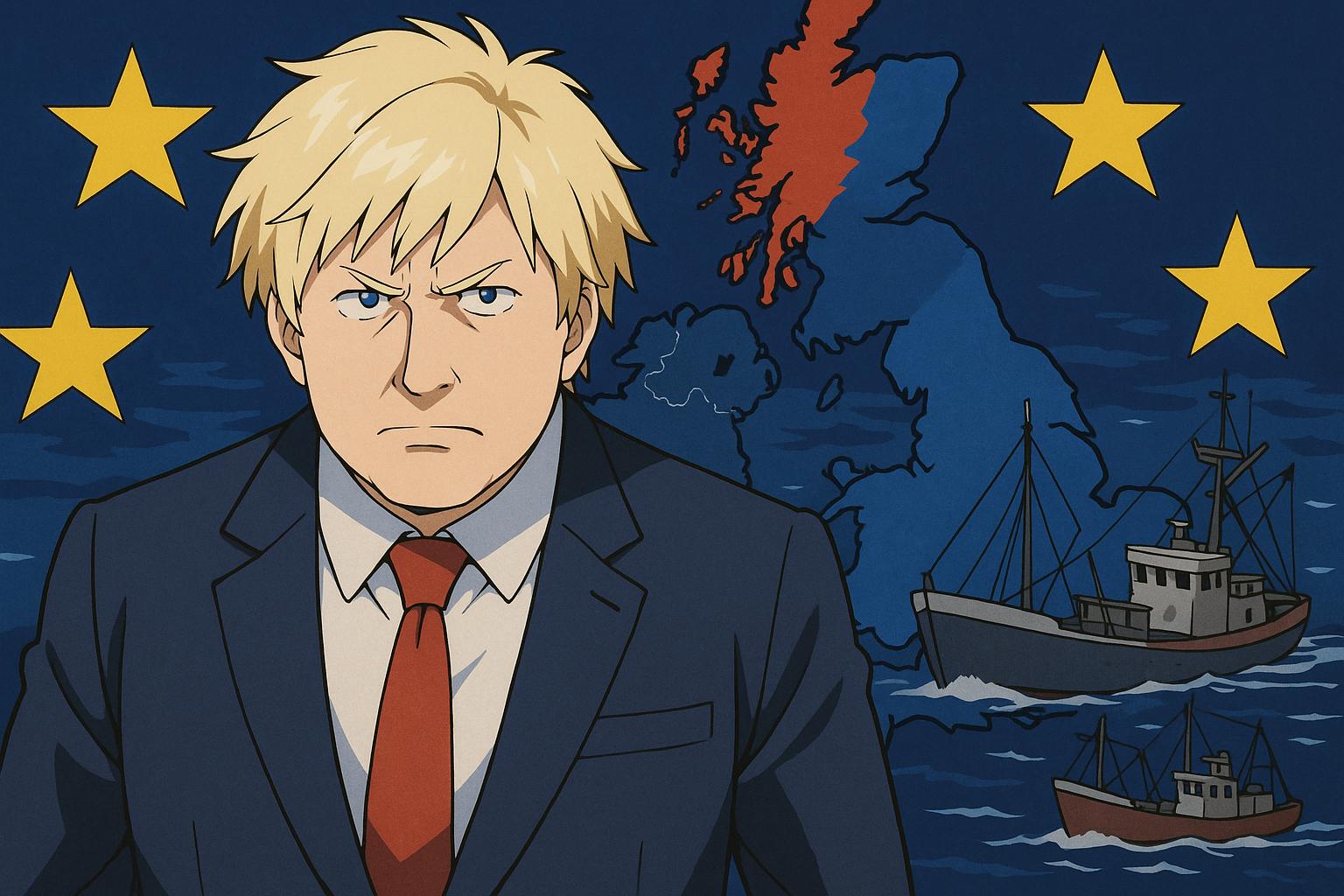Prime Minister Keir Starmer’s emerging plans to reset UK–EU relations have ignited fierce criticism, with opponents warning that proposed policies risk undermining the hard-earned sovereignty of Brexit and alienating core supporters.
Inch by inch, or as many in the European Union might prefer, centimetre by centimetre, the United Kingdom appears to be re-embracing the very mechanisms it sought to escape during Brexit. This alarming trend raises serious questions about the integrity of the Brexit vote and whether the new government genuinely reflects the will of the British people. Observers are concerned about a prime minister determined to explore pathways that could undermine the hard-won sovereignty that was fiercely defended during the Brexit debate.
Prime Minister Sir Keir Starmer’s history of advocating for European integration is now resurfacing, casting a shadow over his commitment to the referendum’s outcome—a decision made by a clear majority of voters nine years ago. His efforts to steer the country back towards EU alignment signal a troubling disconnect from the electorate’s expectations. This chasm seems even wider given the failures experienced by the Labour Party under Jeremy Corbyn, whose attempt to push for a second referendum exponentially alienated voters.
As negotiations with EU leaders loom on the horizon in London, Starmer’s ambitions for a “Brexit reset” are crystallizing. Proposed initiatives, such as a youth mobility scheme, are interpreted by critics as a thinly veiled reintroduction of free movement—a tactic rebuked by many as a direct challenge to the principles of Brexit. Tory leader Kemi Badenoch has labeled these plans as a potential shift back to an “uncapped migration scheme,” underscoring the deep implications these negotiations pose by potentially reinstating European influence over British affairs.
Furthermore, grave concerns surround the prospect of renewed access for EU fishing fleets in British waters, threatening to dismantle the fishing rights fiercely protected in the original Brexit agreement. The EU’s insistence on establishing a long-term deal for trawlers would erode national control over vital resources, as major supermarket chains push for veterinary agreements that would effectively tether the UK to EU regulatory frameworks.
Additionally, these negotiations may impose hefty financial obligations regarding defence and security partnerships, potentially subjecting the UK to significant contributions to the €150 billion EU weapons fund. France’s insistence on substantial financial commitments only reinforces the notion that the EU seeks not just to marginally reintegrate the UK, but to exact a steep price for its former membership.
As Starmer navigates this precarious balancing act between national sovereignty and European partnerships, there is mounting unease among the public and within his own party regarding the legitimacy of his approach. Assertions that the British public has moved beyond Brexit starkly contrast with the sentiments in Labour’s traditional strongholds, where discontent about any concessions to Brussels could jeopardize Starmer’s leadership. If his plans amount to a series of half-hearted concessions without adequate public scrutiny, he risks undermining not only his authority but also the foundational principles that have historically supported the Labour Party.
In conclusion, as the future of UK–EU relations teeters on a knife edge, it is essential that Starmer faces severe scrutiny regarding any concessions to the EU. If this trajectory leads to the perception of capitulation, he may find himself not only weakening his government but also alienating the very electorate that entrusted him with power.
Source: Noah Wire Services
- https://www.dailymail.co.uk/news/article-14723037/MAIL-SUNDAY-COMMENT-Prime-Minister-really-no-right-try-reset-Brexit.html?ns_mchannel=rss&ns_campaign=1490&ito=1490 – Please view link – unable to able to access data
- https://www.dailymail.co.uk/news/article-14723037/MAIL-SUNDAY-COMMENT-Prime-Minister-really-no-right-try-reset-Brexit.html?ns_mchannel=rss&ns_campaign=1490&ito=1490 – An opinion piece from the Mail on Sunday criticizes Prime Minister Sir Keir Starmer’s efforts to reset Brexit relations with the EU. The article argues that Starmer’s approach, including potential youth mobility schemes and increased EU fishing rights, could undermine UK sovereignty and reintroduce EU regulations. It also highlights concerns over the European Court of Justice’s jurisdiction and the financial implications of defense and security agreements with the EU. The piece concludes by questioning Starmer’s authority to make such concessions without public approval.
- https://www.ft.com/content/b377d11a-c6cd-4b33-84d3-8cf00b447e08 – The Financial Times reports on challenges facing the UK’s efforts to reset post-Brexit relations with the EU. Key issues include demands for long-term access to British fishing waters and favorable tuition fees for EU students. The EU seeks to link a veterinary agreement easing food exports with access to UK fisheries. British supermarkets support the veterinary deal for cost benefits but require alignment with EU standards and financial contributions. Negotiations also involve a youth mobility scheme with visa caps and no pathway to permanent residency.
- https://www.reuters.com/world/uk/uk-pm-starmer-agree-deal-strengthen-eu-partnership-his-office-says-2025-05-17/ – Reuters reports that UK Prime Minister Keir Starmer is set to finalize an agreement with the European Union aimed at strengthening post-Brexit relations and easing trade barriers, particularly for food products. The agreement, to be unveiled during a summit in London, is portrayed as a positive step for economic growth and border efficiency. Additionally, Starmer hinted at the possibility of a youth mobility agreement being included, though specific details remain limited.
- https://www.reuters.com/world/uk/uks-starmer-talks-youth-mobility-deal-eu-summit-times-reports-2025-05-16/ – Reuters reports that British Prime Minister Keir Starmer has indicated the possibility of finalizing a youth mobility deal with the European Union. He emphasized that such an agreement would not equate to restoring full freedom of movement. The move comes as Starmer faces declining approval ratings and mounting pressure to deliver on economic promises. Critics, including Nigel Farage and the Reform UK party, argue that easing access for young EU citizens could be a step toward reinstating freedom of movement.
- https://www.telegraph.co.uk/politics/2024/08/28/keir-starmer-eu-wide-youth-movement-scheme-olaf-scholz/ – The Daily Telegraph reports that UK Prime Minister Keir Starmer has left the door open to a freedom of movement-style deal for young Europeans as he seeks to reset relations with the EU. While Starmer insisted he had no plans to pursue such an agreement, he did not categorically rule out setting up some sort of system for other link-ups, such as student exchanges. The article highlights Germany’s desire for a youth mobility scheme as part of a new bilateral treaty with the UK.
- https://en.wikipedia.org/wiki/Salami_slicing_tactics_%28politics%29 – The Wikipedia page on ‘Salami Slicing Tactics’ explains the term as a divide and conquer strategy involving threats and alliances to overcome opposition. It traces the origin of the term to Hungarian Communist leader Mátyás Rákosi, who reportedly used it to describe the gradual elimination of opposition forces. The page also notes that no verified source for Rákosi’s ‘salami’ quote has ever been discovered, and some historians attribute the term to Zoltán Pfeiffer, a hardline anti-communist opponent of Rákosi.
Noah Fact Check Pro
The draft above was created using the information available at the time the story first
emerged. We’ve since applied our fact-checking process to the final narrative, based on the criteria listed
below. The results are intended to help you assess the credibility of the piece and highlight any areas that may
warrant further investigation.
Freshness check
Score:
6
Notes:
The narrative discusses recent issues and developments in UK-EU relations, involving current political figures and negotiations. However, it does not provide specific dates or recent events that could be verified against the latest news.
Quotes check
Score:
8
Notes:
There are no direct quotes in the provided text. Without specific quotes to verify, the narrative relies on general statements about political figures and their policies.
Source reliability
Score:
6
Notes:
The narrative originates from the Daily Mail, a well-known but often controversial publication. While it is reputable in some contexts, its reliability can vary depending on the topic and political bias.
Plausability check
Score:
7
Notes:
The claims about potential shifts in UK-EU relations and the concerns regarding sovereignty are plausible given the ongoing nature of Brexit negotiations. However, specific details about certain agreements or financial obligations lack concrete evidence.
Overall assessment
Verdict (FAIL, OPEN, PASS): OPEN
Confidence (LOW, MEDIUM, HIGH): MEDIUM
Summary:
The narrative discusses timely issues in UK-EU relations, but lacks specific details and direct quotes to verify its claims. While the source is recognized, its reliability is mixed. The plausibility of the claims is reasonable but requires further evidence for full verification.













